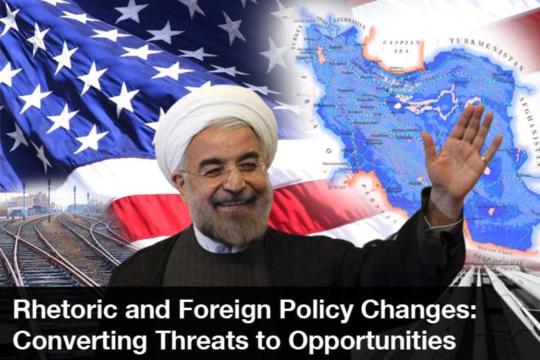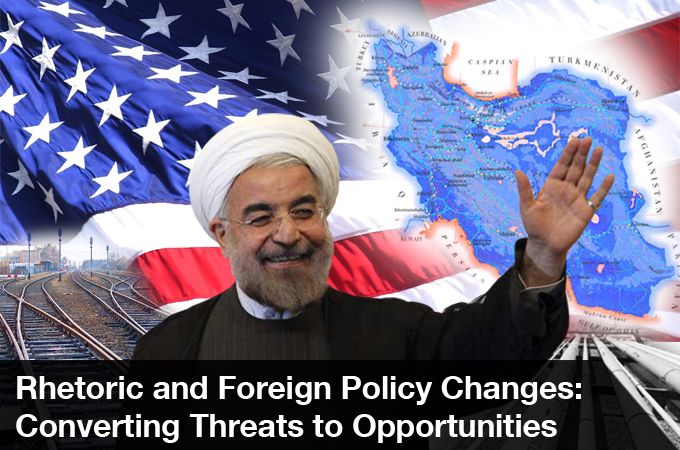
 |
| [AlJazeera] |
Analyses and forecasts on Iran-US rapprochement and on the future of Iran’s role vary. Some believe that rapprochement will influence the course of political events in the region and re-shape its map. Others are more cautious, pointing to challenges and obstacles that will reduce the possibility of its success. This concluding chapter of the Centre’s Iran project provides a list of key findings from the components of the project.
This research project outlined and discussed the future of Iran-US rapprochement and Iran’s expanding international role. Its chapters were written by Iranian affairs and international relations researchers and experts. The project included the following chapters:
1. Introduction.
2. Iran in World Politics After Rouhani – Dr. Arshin Adib-Moghaddam, head of Centre for Iranian Studies at the University of London.
3. Future of Iran-US Relations – Ambassador Seyed Hossein Mousavian, member of Iran’s former nuclear issue negotiating team and visiting researcher at Princeton University.
4. Domestic Voices: Actors in Iran’s Political Arena – Farah Al-Zaman Abu Shuair, Tehran-based researcher and media activist .
5. Mechanisms of Iran-US Rapprochement: Lessons from the Past – Dr. Mark Katz, professor of international relations at George Mason University’s US campus.
6. Iran-US Rapprochement: Where Does the Path to Jerusalem Cross? – Dr. Fatima Al-Smadi, researcher at Al Jazeera Centre for Studies.
7. Iran-Russia Relations in Light of Iran-US Rapprochement – Karina Fayzullina, Russian researcher specialising in international relations.
8. Iran-US Rapprochement and Iran-Turkey Relations: Potential Opportunities and Threats – Dr. Mohammad Jaber Thalji, researcher specialising in Turkish affairs.
9. Iran’s Growing Role in Central Asia? Geopolitical, Economic and Political Profit and Loss Account – Dr. Sebastien Peyrouse, research professor of international affairs at George Washington University.
10. Summary and Results.
Findings:
1. The strategic preferences of any state, including Iran, do not suddenly change when the government changes. They are embedded in institutions and formed systemically, carrying deep and broad dimensions beyond day-to-day politics.
2. Rouhani’s rise to power should be seen as one of the more obvious manifestations of the gradual changes that have been taking place in the domestic politics of post-revolutionary Iran. He is a product of the post-revolutionary generation that longed for reforms but is compelled to continue to work within the general strategic framework of the Islamic Republic.
3. Iran has significantly changed under Rouhani’s rule, especially with regards to international affairs and reconciliation with the United States; however, these changes are hampered by the state’s long-term strategic preferences which will continue directing the Islamic Republic’s foreign policy.
4. These strategic preferences do not preclude closer relations with the United States and even an implicit change in policies towards Israel, but they make it impossible for Iran to be seen as a follower.
5. Trends in the political arena with regards to Iran’s relationship with Washington are linked to three schools of ideological thought:
• The first school, to which Ayatollah Ali Khamenei belongs, believes that the United States cannot abandon its hegemonic policies. The advocates of this school look at any reconciliation efforts with utmost suspicion. However, adherents do not categorically reject easing tensions between the two countries.
• The second school, to which the radicals belong, emphasises the existence of inherent hostility between the Islamic regime of Iran and the West. They say that the only way is through resistance, and their point of view is that negotiations imply accepting defeat and are a red line.
• The third school, representing the moderate camp, includes symbolically prominent former Iranian President Rafsanjani and current president Hassan Rouhani. This school believes there are many common interests between Iran and the United States adversely affected by hostile relations between the two countries.
6. Within the religious establishment in Iran, there are both moderate and fundamentalist clerics. According to statements from the Seminary, their scholars' views on rapprochement support that of the Supreme Leader.
7. If current Iranian foreign policy proves to be merely an interim tactic, Iran-US rapprochement will be short lived even if agreement is reached on the nuclear issue.
8. Rapprochement efforts between Russia and America, and between China and America at the beginning of the 1970s suggest the following: If Iran is looking for a solution to the nuclear issue but continues what some consider to be hostile policies, rapprochement efforts with the United States will probably not succeed. However, if Iran is looking at improving its relations with America's allies in the region, the ongoing rapprochement efforts may succeed.
9. Rapprochement with the US will probably involve a political exchange of interests rather than honesty at all levels. Iranian policy-makers realise that openness toward the United States and full normalisation of relations would effectively reveal the domestic fragility and discord that exists between the regime and its citizens.
10. Iranian officials are aware the concrete process of change required and expected of them, especially on the Palestinian issue, would not be tactical in the context of Iran-US rapprochement, so they continue to manoeuvre and dodge this issue.
11. Today, Rouhani and his team adopt a philosophy based on the assumption that Iran’s ability to “transform threats into opportunities” depends on a change in discourse and foreign policy and opening up dialogue with the United States and the West, including Israel.
12. The strength and influence of those opposing rapprochement with the United States and of those opposing concessions on the Palestinian issue cannot be underestimated, especially because they hold high security and Revolutionary Guard positions. Thus, the expectation is they will maintain their hostility to Israel. If the Geneva Accord fails and economic sanctions on Iran are not lifted, the opposition may take the opportunity to force its hand, making it impossible for Rouhani to progress with negotiations. In this situation, it will not be inconsistent with “Iranian flexibility” if Iran makes a significant effort to repair and significantly strengthen their relationship with Hamas.
13. Continuity of Iran-US rapprochement could give Iran greater opportunity to increase its influence in Afghanistan, Lebanon, Syria and Iraq, forcing Western powers to give it more attention than even Turkey enjoys. This would also limit Turkey’s role in the region.
14. Turkey, which adopts a practical and flexible foreign policy, is unlikely to stand by and watch as Iran extends its influence, and will try to participate in any political project related to the core issues of the region, especially the Syrian crisis.
15. The recent slow rapprochement of relations between Iran and the United States has caused speculation that Iran could barter friendship with Moscow for preferential treatment from Washington regarding Middle East policies. This possibility is far-fetched for the following reasons:
• Unstable and unpredictable environments complicate policy-making processes. Alliances that were established in the twentieth century no longer exist, making known methods of crisis management unworkable. This is evident in the consequences of the Arab Spring, particularly in Egypt and Tunisia.
• The past and current superpowers and leaderships, with all their experience in manoeuvring, persuasion and intimidation, have failed to contain the flow and liquidity of events.
• In these circumstances, Iran, as a regional power in its own right, is not likely to be reformed by the Kremlin or the White House after decades of confrontation. Iran’s sense of self-respect and national pride prevent it from becoming subdued by US influence.
• Internal contradictions do not allow America to adopt a long-term strategy based on comprehensive reconciliation with Iran.
16. Iran’s rich history and ambition are clear: it is a centre of Shia culture and politics with experience as an empire and state both before and after the arrival of Islam, as well as complex history with Russia, all of which plays a role in counterbalancing regional Sunni cooperation.
17. Some over-estimate Iran's religious and political influence in Central Asia. In general, the expansion of political Islam inspired by Shiite Iran's model is exaggerated: Iran has not tried to use its religious influence in Central Asia as it did in Lebanon, Syria and Palestine and has not supported the mobilisation of the Shiite minority in the region.
18. The effective integration of Iran on the international scene will lead to an expanded partnership between the West and Central Asia. New cooperation sectors are emerging, including hydropower, minerals, industrial processing and auto-production. Iran's experience in these sectors may be utilised. In addition, Iran’s geographical position gives it real value in the eyes of the Central Asian states, which are often keen to secure access to the South Seas and the Mediterranean basin.
19. The Iranian state offers itself as a pragmatic partner which is willing to put aside ideological differences with Afghanistan and its neighbours in Central Asia in order to promote regional cooperation. For example, in order to promote regional cooperation, Iran would be willing to overlook potential partners’ positions on Israel or the fact that they are secular states. In exchange, Iran is unlikely to waste any opportunity to assert itself in the regional arena.
These key findings are a broad overview and offer testable theories for future research on Iran-US rapprochement as well as Iran’s regional role and relations with other nations.